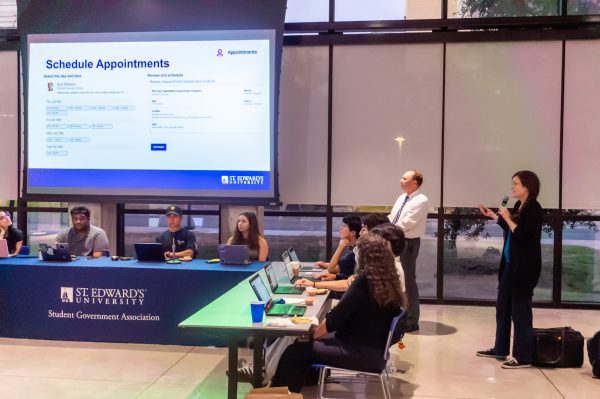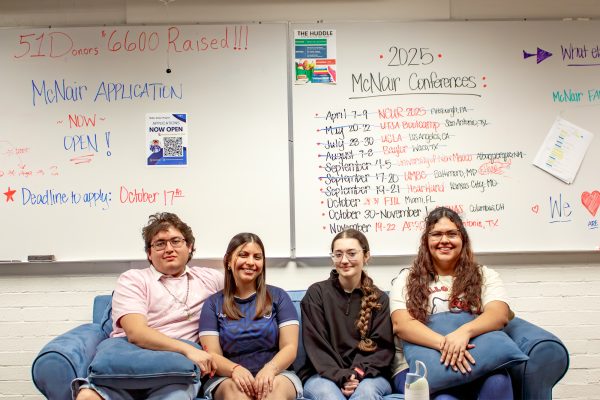Undocumented status changes priorities in college
In her attempt to create a better future for herself, she is faced with obstacles that many people her age do not have to deal with given her status as an undocumented immigrant.
For most American students, college offers a consequence-free time to have fun and experiment, but for the 65,000 undocumented immigrants who graduate high school each year, it’s not about fun. It’s about managing to not get deported while trying to earn a degree.
This is true for St. Edward’s University freshman Leyda Estrada. She wishes she could go downtown and have fun like the rest of her friends, but the possibility of getting in trouble with the law and risking deportation is too high.
Other students have the opportunity to make mistakes and be forgiven. Estrada, however, cannot afford to make the same mistakes.
“I’m 17 years old, but I go to college and I want to go out and have fun with my friends, but I can’t,” Estrada said. “I know a lot of people get fake IDs and stuff. I can’t do that because if I get caught that will go on my record and they won’t allow me to renew my DACA (Deferred Action for Childhood Arrival).”
Estrada is pursuing a career as a writer. She wants to tell stories that are unique and that will open conversation about important issues.
In her attempt to create a better future for herself, she is faced with obstacles that many people her age do not have to deal with given her status as an undocumented immigrant.
When she was two years old, Estrada was brought from Mexico to the United States by her mother. Her father had already been living in Austin. Because his job provided more financial stability than life in Mexico, her mother packed up her and her then-four-year-old brother and headed for the United States.
“My dad was the manager of a restaurant and my mom was a nurse. We lived a comfortable life,” Estrada said. “But when I was two years old, my mom, my brother and I crossed the border. We did get arrested. I don’t remember exactly what happened, since I was so young.”
As a two-year-old, Estrada had no idea what was happening. She had no say in the decision. But today, 15 years later, the choices that her parents made still stand as a roadblock to her achieving her goals.
All throughout her pre-college education, her undocumented immigrant status was a subject of worry. Estrada recounts having to lie about her family many times in fear of being discovered.
This fear her family has may change if leaders in Washington, D.C. reform the current immigration system.
In an attempt to implement some sort of reform, President Barack Obama issued an executive order last year to reprieve any legal action against undocumented immigrants who have resided in the U.S. for at least five years.
The executive order also expanded DACA. Before the expansion, DACA was only granted to young immigrants who are under 30 and were brought into the U.S. as children. Obama’s executive order has expanded DACA to those older than 30.
With all of this action around immigration, it is no doubt that it will play an important role in the upcoming presidential election.
“(Immigration) is going to be a huge issue because immigration is federal policy,” political science professor Brian Smith said. “When we read the constitution, immigration is one of the things that is clearly stated as a federal responsibility. The burden of cost falls on the states but the policy is federal. So I think it’s going to be a very important issue.”
One of the Republican leaders on immigration is Florida Sen. Marco Rubio. He was a leading voice on a recent bipartisan immigration reform bill that failed in 2013. The failure of that bill hurt Rubio in the polls, but did not detract him from running for president.
Rubio announced that he is running for president Monday in Miami at the Freedom Tower — an important site for Cuban immigrants. Rubio also has the distinction of being one of two Latinos running for president — Texas Sen. Ted Cruz is the other.
Along with being a Latino, the fact that Rubio represents Florida, a state with one of the highest percentage of immigrants, helps him make the case that he can reform the immigration system, Smith said. The same thought also applies to Cruz, since he represents Texas.
Hillary Clinton, the Democratic frontrunner for president, has been a supporter of Obama’s executive order on immigration. She has also urged Congress to pass a bipartisan immigration reform bill. Congress has yet to do that.
During Clinton’s first run for president, then-President George W. Bush proposed a comprehensive immigration reform bill to Congress. Clinton voted in favor of it as did Sen. John McCain and then-Sens. Barack Obama and Joe Biden.
While immigration might not be at the front and center of each presidential candidate’s platform — at least right now — it is no doubt an extremely important factor for Estrada and her family.
“I hope (the government) will give us a chance to have the same rights as everyone else,” Estrada said.






